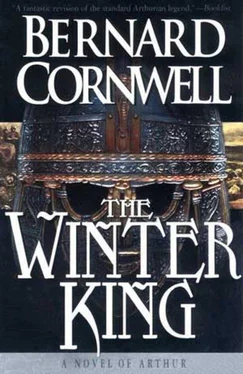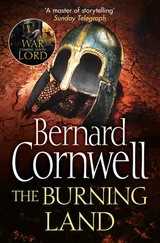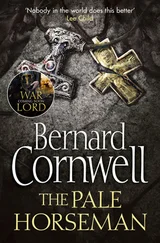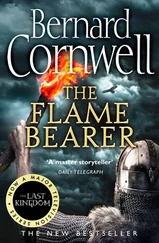“I release you from those oaths,” Arthur said, 'asking only that if you live you stand by my promise to see Mordred grow into our King."
There was silence again. None of us, I think, wavered in our loyalty, but nor did we know how to express it until Galahad spoke. “I swore you no oath,” he said to Arthur, 'but I do now. Where you fight, Lord, I fight, and he who is your enemy is mine, and he who is your friend is my friend also. I swear that on the precious blood of the living Christ.“ He leaned forward, took Arthur's hand and kissed it. ”May my life be forfeit if I break my word."
“It takes two to make an oath,” Culhwch said. “You might release me, Lord, but I don't release myself.”
“Nor I, Lord,” I added.
Sagramor looked bored. “I'm your man,” he said to Arthur, 'no one else's."
“Bugger the oath,” ugly Morfans said, “I want to fight.” Arthur had tears in his eyes. For a time he could not speak, so instead he busied himself ramming at the fire with a log until he had succeeded in halving its warmth and doubling its smoke. “Your men are not oath-bound,” he said thickly, 'and I want none but willing men in Lugg Vale tomorrow."
“Why tomorrow?” Culhwch asked. “Why not the day after? The more time we have to prepare, the better, surely?”
Arthur shook his head. “We'll be no better prepared if we wait a whole year. Besides, Gorfyddyd's spies will already be going north with news that Tewdric is accepting Gorfyddyd's terms, so we must attack before those same spies discover that we Dumnonians have not retreated. We attack at dawn tomorrow.” He looked at me. “You will attack first, Lord Derfel, so tonight you must reach your men and talk to them, and if they prove unwilling, then so be it, but if they are willing then Morfans can tell you what they must do.”
Morfans had ridden the whole enemy line, flaunting himself in Arthur's armour but also reconnoitring the enemy positions. Now he took handfuls of grain from a pot and piled them on his outspread cloak to make a rough model of Lugg Vale. “It's not a long valley,” he said, 'but the sides are steep. The barricade is here at the southern end.“ He pointed to a spot just inside the modelled valley. ”They felled trees and made a fence. It's big enough to stop a horse, but it won't take long for a few men to haul those trees aside. Their weakness is here.“ He indicated the western hill. ”It's steep at the northern end of the valley, but where they built their barricade you can easily run down that slope. Climb the hill in the dark and in the dawn you attack downhill and dismantle their tree fence while they're still waking up. Then the horses can come through." He grinned, relishing the thought of surprising the enemy.
“Your men are used to marching by night,” Arthur told me, 'so at dawn tomorrow you take the barricade, destroy it, then hold the vale long enough for our horse to arrive. After the horse our spearmen will come. Sagramor will command the spearmen in the vale while I and fifty horsemen attack Branogenium." Sagramor showed no reaction to the announcement which gave him command of most of Arthur's army. The rest of us could not hide our astonishment, not at Sagramor's appointment, but at Arthur's tactics.
“Fifty horsemen attacking Gorfyddyd's whole army?” Galahad asked dubiously.
“We won't capture Branogenium,” Arthur admitted, 'we may not even get close, but we shall stir them into a pursuit and that pursuit will bring them down to the vale. Sagramor will meet that pursuit at the vale's northern end, where the road fords the river, and when they attack, you retreat.“ He looked at us in turn, making sure we understood his instructions. ”Retreat,“ he said again, 'always retreat. Let them think they win! And when you have sucked them deep into the valley, I shall attack.”
“From where?” I asked.
“From behind, of course!” Arthur, energized by the prospect of battle, had regained all his enthusiasm.
“When my horsemen retreat from Branogenium we won't go back into the vale, but hide outside its northern end. The place is smothered in trees. And once you've sucked the enemy in, we'll come from their rear.”
Sagramor stared at the piles of grain. “The Blackshield Irish at Coel's Hill,” he said in his execrable accent, 'can march south of the hills to take us in the rear,“ he pushed a finger through the scattered grains at the Vale's southern end to show what he meant. Those Irish, we all knew, were the fearsome warriors of Oengus Mac Airem, King of Demetia, who had been our ally until Gorfyddyd had changed his loyalty with gold. ”You want us to hold an army in front and the Blackshields behind?" Sagramor asked.
“You see,” Arthur said with a smile, 'why I offer to release you from your oaths. But once Tewdric knows we're embattled, he'll come. As the day passes, Sagramor, you will find your shield-line thickening by the minute. Tewdric's men will deal with the enemy from Goel's Hill."
“And if they don't?” Sagramor asked.
“Then we will probably lose,” Arthur admitted calmly, 'but with my death will come Gorfyddyd's victory and Tewdric's peace. My head will go to Ceinwyn as a present for her wedding and you, my friends, will be feasting in the Otherworld where, I trust, you will keep a place at table for me." There was silence again. Arthur seemed sure that Tewdric would fight, though none of us could be so certain. It seemed to me that
Tewdric might well prefer to let Arthur and his men perish in Lugg Vale and thus rid himself of an inconvenient alliance, but I also told myself that such high politics were not my concern. My concern was surviving the next day and, as I looked at Morfans's crude model of the battlefield, I worried about the western hill down which we would attack in the dawn. If we could attack there, I thought, so could the enemy. “They'll outflank our shield-line,” I said, describing my concern. Arthur shook his head. “The hill's too steep for a man in armour to climb at the vale's northern end. The worst they'll do is send their levies there, which means archers. If you can spare men, Derfel, put a handful there, but otherwise pray that Tewdric comes quickly. To which end,” he said, turning to Galahad, 'though it hurts me to ask you to stay away from the shield-wall, Lord Prince, you will be of most value to me tomorrow if you ride as my envoy to King Tewdric. You are a prince, you speak with authority and you, above all men, can persuade him to take advantage of the victory I intend to give him by my disobedience."
Galahad looked troubled. “I would rather fight, Lord.”
“On balance,” Arthur smiled, “I would rather win than lose. For that, I need Tewdric's men to come before the day's end and you, Lord Prince, are the only fit messenger I can send to an aggrieved king. You must persuade him, flatter him, plead with him, but above all, Lord Prince, convince him that we win the war tomorrow or else fight for the rest of our days.”
Galahad accepted the choice. “Though I have your permission to return and fight at Derfel's side when the message is delivered?” he added.
“You will be welcome,” Arthur said. He paused, staring down at the piles of grain. “We are few,” he said simply, 'and they are a host, but dreams do not come true by using caution, only by braving danger. Tomorrow we can bring peace to the Britons.“ He stopped abruptly, struck perhaps by the thought that his ambition of peace was also Tewdric's dream. Maybe Arthur was wondering whether he should fight at all. I remembered how after our meeting with Aelle, when we made the oath under the oak, Arthur had contemplated giving up the fight and I half expected him to bare his soul again, but on that rainy night the horse of ambition was tugging his soul hard and he could not contemplate a peace in which his own life or exile was the price. He wanted peace, but even more he wanted to dictate that peace. ”Whatever Gods you pray to,“ he said quietly, 'go with you all tomorrow.” I had to ride a horse to get back to my men. I was in a hurry and fell off three times. As omens, the falls were dire, but the road was soft with mud and nothing was hurt but my pride. Arthur rode with me, but checked my horse when we were still a spear's throw from where my men's campfires flickered low in the insistent rain. “Do this for me tomorrow, Derfel,” he said, 'and you may carry your own banner and paint your own shields."
Читать дальше












